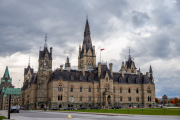Editor's note: The following blog post is one of a series written during a conference on carbon pricing held at Wesleyan University in Connecticut late last year. Over the coming weeks, we'll be posting a collection of blogs and videos from that conference.
Bill McKibben, one of America's best-known climate advocates, stands at the front of a jam-packed lecture hall at a Connecticut university. Behind him, the image of a girl looms large on a screen. She's young, maybe three or four, holding a small plant in a large pot, and staring down the world.
The child is planting the fragile green shoot as a symbolic action in the fight against climate change. The irony is, the plant may never have a chance to grow to maturity in its native soil — and neither may the girl, whose homeland, the small island nation known as the Maldives, is quickly disappearing into the sea as a result of climate change.
"If I were a betting man, I could bet that this girl will become a refugee," McKibben says. "We've had wars and conflicts and displaced people for hundreds of years, but never before have we been able to predict that entire nations will become displaced as we can today."
 This is the face of climate change. And it's one McKibben is working to bring to the world — especially the wealthy west, in countries like the United States and Canada, where some companies in the powerful energy industry lobby, and even some government officials, are working to stall political momentum toward reducing our reliance on high-carbon fossil fuels.
This is the face of climate change. And it's one McKibben is working to bring to the world — especially the wealthy west, in countries like the United States and Canada, where some companies in the powerful energy industry lobby, and even some government officials, are working to stall political momentum toward reducing our reliance on high-carbon fossil fuels.
"We watched the Arctic melt again this summer," McKibben says. "We watched what happened in Moscow and Pakistan....Climate change, global warming, is coming faster and harder than we thought.
"There are strong symbolic things we can do," he adds, pointing for example to President Obama's recent decision to re-install solar panels on the White House in response to pressure from environmentalists.
"But mostly what we need to be thinking about are people in places that really are getting screwed."
So saying, McKibben flips through photos taken on the most recent global day of climate action, designed to pressure world leaders to adopt science-based climate policies. Monks in Mongolia. Rock climbers in Vermont. Fifteen thousand marchers in Addis Ababa. Clusters of Palestinians, Israelis and Arabs, on their respective shores of the Dead Sea. A solitary woman holding a poster board in Iran, the rest of her group having been weeded out at a series of checkpoints en-route to the demonstration.
And the sad eyes of the young girl holding the green plant that is bound to be swallowed by the sea.
"Whatever we do, it has to happen pretty fast, and we don't get to set the rules," McKibben notes. "The bottom line of this dilemma that we face is set by physics and chemistry....There is no guarantee that we're going to win, and we may well have waited too late to get started."
[youtube:RS-TnAu1RqU,width=480|aspect=16:9]
Given the current political climate in the U.S. and the high stakes of delay, there are moments at this conference where the scale of the problem seems to loom too large, where optimism seems (understandably) to be in short supply. And yet, there seems to be something different stirring here too.
Between sessions, participants sit in tight groups discussing serious policy issues around the official topic of "pricing carbon" — how to make polluters pay to dump emissions into the atmosphere — along with ideas for art projects, community-based climate action networks, low-carbon travel incentives for workplaces and business models that make a strong case for investing in renewable energy.
"We're never going to match [the oil lobby] dollar for dollar, so we damn well better figure out some other currency to work in," McKibben says. "The best think I can think of is bodies and spirit."
If a photograph is worth a thousand words, the images of the world's poor facing down the changing climate speak volumes about the urgency with which we need to approach this challenge at home. Climate solutions are within our reach. By using less energy, investing in power that comes from the wind and the sun instead of fossil fuels, and supporting policies that will help create jobs and support innovation in the new low-carbon economy, Canadians are joining the global movement to fight climate change.
Of course, it's not just up to individuals. But backed by strong government action to reduce our greenhouse gas emissions and help developing countries implement solutions, we Canadians could stand in solidarity with those most vulnerable to climate change, while making the investments we need to build a stronger, more competitive, more resilient future for Canada.





